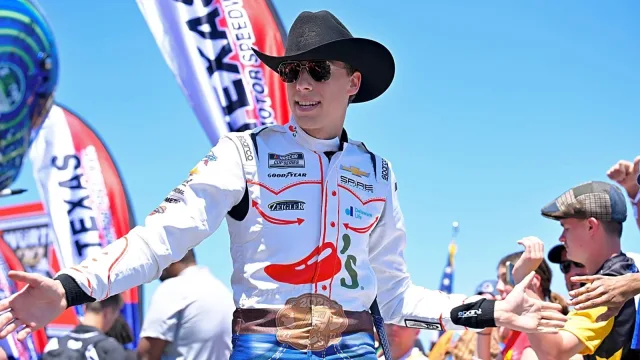Connor Zilisch has called attention to what he describes as Carson Hocevar’s “tough guy” act in the NASCAR garage, after Hocevar made waves for having no interest in friendships with other drivers. This development, centered on the “Carson Hocevar tough guy act,” highlights the ongoing discussion within NASCAR regarding personality and its impact on relationships among drivers.
Spotlight on Hocevar’s Garage Demeanor
The topic surfaced when 22-year-old Carson Hocevar, already known for his strong on-track presence, made headlines by stating on the Dale Jr. Download podcast that he has no friends in the Cup Series garage and does not wish to make any. His comments quickly sparked reactions among fans, racers, and commentators, stirring debates about individual approaches to camaraderie and competition in modern NASCAR.
Connor Zilisch, a rising figure in the NASCAR world, offered an alternative outlook in a recent conversation on the Stacking Pennies podcast hosted by Corey LaJoie. When prompted about his own friendly style and Hocevar’s insular attitude, Zilisch distinguished his perspective on the sport’s social environment.
“We’re going to be here most of our, like we’re going to be in this sport for 20 years. Like, why be miserable? And why don’t you want to like, you’re going to see these guys every week for the next 20 years of your life.”
—Connor Zilisch, NASCAR Driver
Zilisch Accuses Hocevar of Playing Up His Persona
According to Zilisch, Hocevar’s public statements do not fully align with his behavior in person. While Hocevar may claim to be uninterested in forming connections, Zilisch pointed out that interactions between the two are generally cordial.
“Like part of me, I hate saying this, but like every time I walk past him in the garage, like we say hi. It’s not like he’s, I feel like he (Hocevar) was playing a little bit of the tough guy on the Download.”
—Connor Zilisch, NASCAR Driver
Zilisch further observed that Hocevar’s off-track tendencies differ from his demeanor amidst his fellow drivers at the racetrack. He sees Hocevar’s supposed detachment as partly a constructed image rather than a reflection of genuine isolation.
“Yes, he might not hang out with people away from the racetrack, but I feel like he’s a pretty personable guy at the racetrack. I think he was playing it a little tough,”
admitted Zilisch.
Friendliness as a Long-Term Choice in NASCAR
Reflecting on his own philosophy, Zilisch emphasized the importance of enjoyment and positive relationships given the close proximity in which drivers work. He advocates for a more sociable garage atmosphere, considering the longevity of many racing careers.
“But yeah, I mean for me, I don’t know. I want to enjoy my life. I want to be able to enjoy my time with the people I’m going to be around the most. And if that’s the people at the racetrack, then yeah, I mean, I want to be friends.”
—Connor Zilisch, NASCAR Driver
The contrasting approaches of Carson Hocevar and Connor Zilisch reflect diverging philosophies within NASCAR’s evolving culture. As public and private personas come under scrutiny, figures like Corey LaJoie and the wider Cup Series community continue to watch how these relationships influence the sport’s environment, potentially shaping both competition and camaraderie in the garage for years to come.
